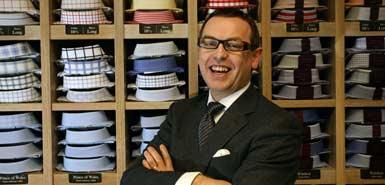 to not show photographer information --> to not show image description -->
to not show photographer information --> to not show image description -->
Geoff Quinn, managing director of shirt maker and taylor TM Lewin
Propped against a wall in TM Lewin's offices in Central London is a collage of sharp-suited icons. Michael Caine is there, menacingly holding a machinegun. A debonair Sidney Poitier lingers near a couple of Bond incarnations.
This stellar get-together is headlined “Who we want to be”, a reminder of where the shirtmaker and tailor is aiming in an industry in which a lack of focus is deadly. As smart menswear appears to be sliding backwards, TM Lewin has ploughed its own furrow, applying its own idiosyncratic business model seemingly undaunted by what is going on around it.
It has grown by nearly 50 per cent since a management buyout in 2006. Sales are believed to be 21 per cent ahead of last year, with its financial year concluding at the end of February. Like-for-like sales are thought to be in positive, mid-single digits — no mean feat given that downmarket rivals are losing ground, even as consumers are likely to be trading down.
“People want to look sharp, they want confidence, and buying a shirt gives them that cheaply,” Geoff Quinn, TM Lewin's ebullient chief executive, said, explaining how a shirtmaker on the wrong side of midmarket can cope in a recession.
Its City boy customers may be in danger of losing their jobs, but classic cotton shirts — not hairshirts — are the order of the day. This, perhaps, is where TM Lewin's unique strategy of being permanently on promotion comes in. The orthodoxy in clothing retail is that discounts are a necessary evil to shift stock, but reliance on price-cutting sends the wrong signal about the quality of your goods and erodes a shop's ability to sell at full price.
Mr Quinn happily concedes that TM Lewin sells almost everything on offer. Its best-known discount is four shirts for £100, but around it rotates a carousel of eye-catching half-price sales and corporate discounts. Therein lies the TM Lewin puzzle: Sidney Poitier, one imagines, does not chase promotions. “It's about creating a hook as to why it's acceptable to spend money in your business. It's not so much about deeper promotions, but fresher promotions and creating excitement,” Mr Quinn said. The result is that for smart, cotton shirts, TM Lewin competes on price with Marks & Spencer but is perceived as being more upmarket — for now, at least.
Elsewhere in its head office is a huge wall chart that bears a passing resemblance to the periodic table. “That is TM Lewin,” Mr Quinn said, with a nod to the wall. “Everything that's going on in the business in the next year.” Colour-coded blocks chart everything from executives' holidays to store openings. And promotional activity. Lots and lots of promotions.
Price-cutting is a hot topic after the “big three” fashion retailers took markedly different paths to combat a tough Christmas period. M&S held surprise sales in the hope of kick-starting festive spending and to shift stock. Debenhams held its usual “spectaculars”, with one extra day to match M&S. Next held firm until its traditional post-Christmas sale, preserving price position and margins at the expense of volume.
Mr Quinn, who left school with an O level in pottery to join the clothing trade, has been on board from the days when the company had a single store on Jermyn Street and the majority of its business was selling regimental ties and blazers. It added 11 stores last year, taking its total to 67 outlets, with another eight concessions. It hopes to open a womenswear store in the City next year to represent a growing part of the business: womenswear accounts for 17 per cent. Tailoring, another comparatively recent addition, is 20 per cent.
“A few years ago we ran it as a corner shop. In the last few years we've had to professionalise.” It was only last year that an up-to-date stock system was put in place. “January 2008 was the first time I knew what stock I had in my business. We wanted to know what was in our shops, which we thought would be useful in retailing,” Mr Quinn said, deadpan.
This process of “professionalisation” has gone hand-in-hand with the rapid expansion. Indeed, TM Lewin recently moved its head office from its historic home on Jermyn Street to spacious new headquarters in Clerkenwell, on the fringes of the City. Its future may well depend on whether anything important got lost in the move.
Related News
Photos
More>>trade
market
- Sonia Rykiel F/W 2009/10 collection at Paris Fashion Week
- Barbie doll to celebrate its 50th anniversary Monday
- Christian Lacroix F/W 2009/10 women's collection in Paris Fashion Week
- Karl Lagerfeld F/W 2009/10 women's collection at Paris Fashion Week
- Jean-Paul Gaultier F/W 2009/10 women's collection at Paris Fashion Week





